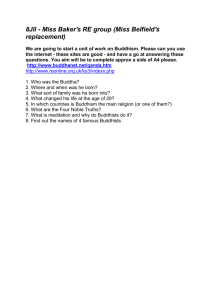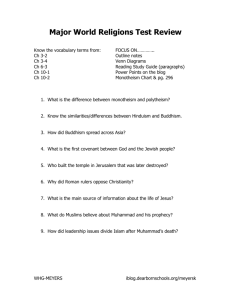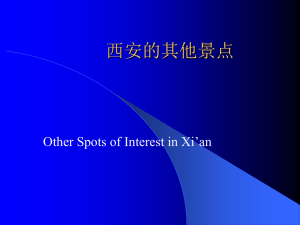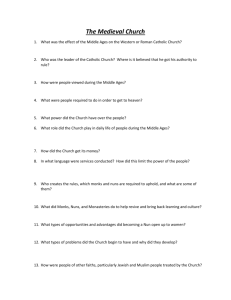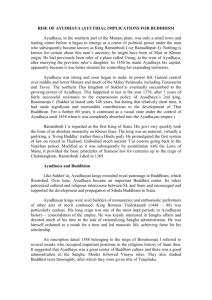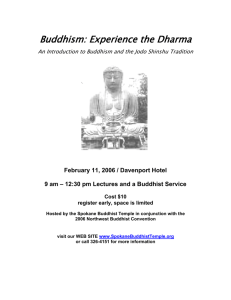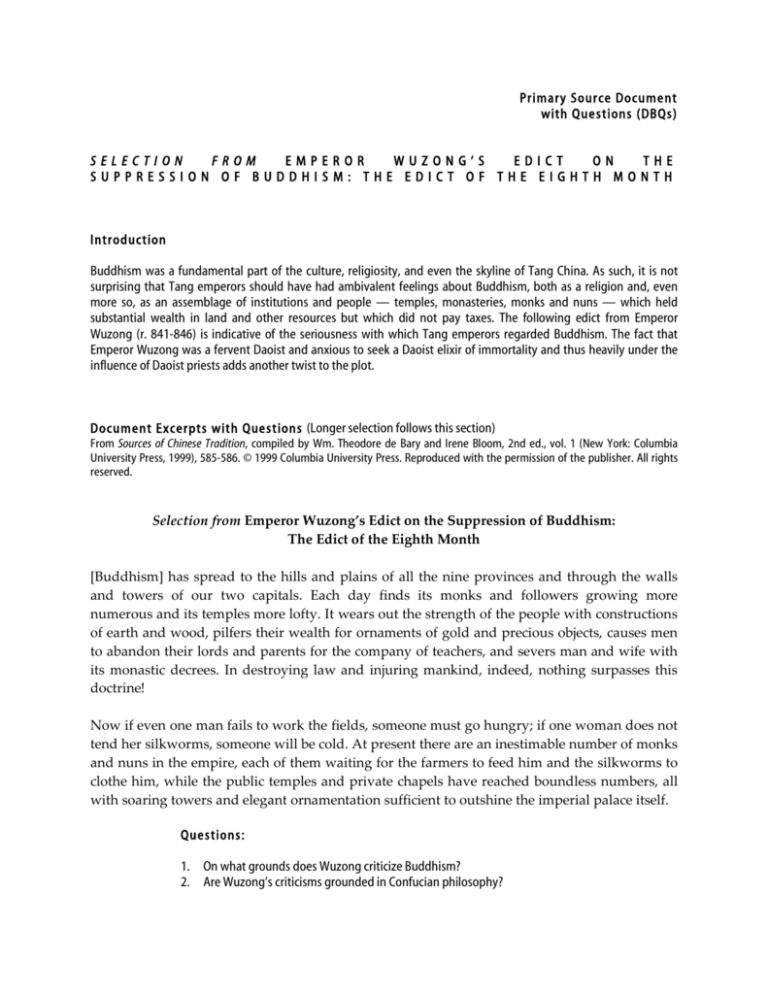
Primary Source Document
with Questions (DBQs)
SELECTION
FROM
EMPEROR
WUZONG’S
EDICT
ON
THE
SUPPRESSION OF BUDDHISM: THE EDICT OF THE EIGHTH MONTH
Introduction
Buddhism was a fundamental part of the culture, religiosity, and even the skyline of Tang China. As such, it is not
surprising that Tang emperors should have had ambivalent feelings about Buddhism, both as a religion and, even
more so, as an assemblage of institutions and people — temples, monasteries, monks and nuns — which held
substantial wealth in land and other resources but which did not pay taxes. The following edict from Emperor
Wuzong (r. 841-846) is indicative of the seriousness with which Tang emperors regarded Buddhism. The fact that
Emperor Wuzong was a fervent Daoist and anxious to seek a Daoist elixir of immortality and thus heavily under the
influence of Daoist priests adds another twist to the plot.
Document Excerpts with Questions (Longer selection follows this section)
From Sources of Chinese Tradition, compiled by Wm. Theodore de Bary and Irene Bloom, 2nd ed., vol. 1 (New York: Columbia
University Press, 1999), 585-586. © 1999 Columbia University Press. Reproduced with the permission of the publisher. All rights
reserved.
Selection
from
Emperor
Wuzong’s
Edict
on
the
Suppression
of
Buddhism:
The
Edict
of
the
Eighth
Month
[Buddhism]
has
spread
to
the
hills
and
plains
of
all
the
nine
provinces
and
through
the
walls
and
towers
of
our
two
capitals.
Each
day
finds
its
monks
and
followers
growing
more
numerous
and
its
temples
more
lofty.
It
wears
out
the
strength
of
the
people
with
constructions
of
earth
and
wood,
pilfers
their
wealth
for
ornaments
of
gold
and
precious
objects,
causes
men
to
abandon
their
lords
and
parents
for
the
company
of
teachers,
and
severs
man
and
wife
with
its
monastic
decrees.
In
destroying
law
and
injuring
mankind,
indeed,
nothing
surpasses
this
doctrine!
Now
if
even
one
man
fails
to
work
the
fields,
someone
must
go
hungry;
if
one
woman
does
not
tend
her
silkworms,
someone
will
be
cold.
At
present
there
are
an
inestimable
number
of
monks
and
nuns
in
the
empire,
each
of
them
waiting
for
the
farmers
to
feed
him
and
the
silkworms
to
clothe
him,
while
the
public
temples
and
private
chapels
have
reached
boundless
numbers,
all
with
soaring
towers
and
elegant
ornamentation
sufficient
to
outshine
the
imperial
palace
itself.
Questions:
1. On what grounds does Wuzong criticize Buddhism?
2. Are Wuzong’s criticisms grounded in Confucian philosophy?
Primary Source Document, with Questions (DBQ) on SELECTION FROM EMPEROR WUZONG’S
EDICT ON THE SUPPRESSION OF BUDDHISM: THE EDICT OF THE EIGHTH MONTH
3. Compare Wuzong’s criticism of Buddhism with that of Han Yu in his
“Memorial on the Bone of the Buddha.” Are there similarities between the
two critiques of Buddhism? Are there differences? What are the
philosophical bases of the two critiques?
4. Comparing Wuzong’s critique of Buddhism with that of Han Yu, which do
you find more convincing? Why?
5. If you were a Buddhist, what arguments could you use to counter Wuzong’s
critique?
The
temples
of
the
empire
that
have
been
demolished
number
more
than
4,600;
26,500
monks
and
nuns
have
been
returned
to
lay
life
and
enrolled
as
subject
to
the
Twice‑a‑Year
Tax;
more
than
40,000
privately
established
temples
have
been
destroyed,
releasing
30
or
40
million
qing
of
fertile,
top‑grade
land
and
150,000
male
and
female
servants
who
will
become
subject
to
the
Twice‑a‑Year
Tax.
Monks
and
nuns
have
been
placed
under
the
jurisdiction
of
the
Director
of
Aliens
to
make
it
perfectly
clear
that
this
is
a
foreign
religion.
Finally,
We
have
ordered
more
than
2,000
men
of
the
Nestorian
and
Mazdean
religions
to
return
to
lay
life
and
to
cease
polluting
the
customs
of
China.
Alas,
what
had
not
been
carried
out
in
the
past
seemed
to
have
been
waiting
for
this
opportunity.
If
Buddhism
is
completely
abolished
now,
who
will
say
that
the
action
is
not
timely?
Already
more
than
100,000
idle
and
unproductive
Buddhist
followers
have
been
expelled,
and
countless
of
their
gaudy,
useless
buildings
destroyed.
…
Questions:
6. In the passage above, Wuzong outlines steps taken against Buddhism.
Considering these steps, what do you think his main goals are in the attempt
to weaken or even eradicate Buddhism?
Longer Selection
From Sources of Chinese Tradition, compiled by Wm. Theodore de Bary and Irene Bloom, 2nd ed., vol. 1 (New York: Columbia
University Press, 1999), 585-586. © 1999 Columbia University Press. Reproduced with the permission of the publisher. All rights
reserved.
Selection
from
Emperor
Wuzong’s
Edict
on
the
Suppression
of
Buddhism:
The
Edict
of
the
Eighth
Month
We
have
heard
that
up
through
the
Three
Dynasties
the
Buddha
was
never
spoken
of.
It
was
only
from
the
Han
and
Wei
on
that
the
religion
of
idols
gradually
came
to
prominence.
So
in
this
latter
age
it
has
transmitted
its
strange
ways,
instilling
its
infection
with
every
opportunity,
spreading
like
a
luxuriant
vine,
until
it
has
poisoned
the
customs
of
our
nation;
gradually,
and
before
anyone
was
aware,
it
beguiled
and
confounded
men’s
minds
so
that
the
multitude
have
Asia for Educators | Columbia University | http://afe.easia.columbia.edu
Page 2 of 3
Primary Source Document, with Questions (DBQ) on SELECTION FROM EMPEROR WUZONG’S
EDICT ON THE SUPPRESSION OF BUDDHISM: THE EDICT OF THE EIGHTH MONTH
been
increasingly
led
astray.
It
has
spread
to
the
hills
and
plains
of
all
the
nine
provinces
and
through
the
walls
and
towers
of
our
two
capitals.
Each
day
finds
its
monks
and
followers
growing
more
numerous
and
its
temples
more
lofty.
It
wears
out
the
strength
of
the
people
with
constructions
of
earth
and
wood,
pilfers
their
wealth
for
ornaments
of
gold
and
precious
objects,
causes
men
to
abandon
their
lords
and
parents
for
the
company
of
teachers,
and
severs
man
and
wife
with
its
monastic
decrees.
In
destroying
law
and
injuring
mankind,
indeed,
nothing
surpasses
this
doctrine!
Now
if
even
one
man
fails
to
work
the
fields,
someone
must
go
hungry;
if
one
woman
does
not
tend
her
silkworms,
someone
will
be
cold.
At
present
there
are
an
inestimable
number
of
monks
and
nuns
in
the
empire,
each
of
them
waiting
for
the
farmers
to
feed
him
and
the
silkworms
to
clothe
him,
while
the
public
temples
and
private
chapels
have
reached
boundless
numbers,
all
with
soaring
towers
and
elegant
ornamentation
sufficient
to
outshine
the
imperial
palace
itself.
…
Having
thoroughly
examined
all
earlier
reports
and
consulted
public
opinion
on
all
sides,
we
no
longer
have
the
slightest
doubt
in
Our
mind
that
this
evil
should
be
eradicated.
Loyal
ministers
of
the
court
and
provinces
have
lent
their
aid
to
Our
high
intentions,
submitting
most
apt
proposals
that
We
have
found
worthy
of
being
put
into
effect.
Presented
with
an
opportunity
to
suppress
this
source
of
age‑old
evil
and
fulfill
the
laws
and
institutions
of
the
ancient
kings,
to
aid
mankind
and
bring
profit
to
the
multitude,
how
could
We
forbear
to
act?
The
temples
of
the
empire
that
have
been
demolished
number
more
than
4,600;
26,500
monks
and
nuns
have
been
returned
to
lay
life
and
enrolled
as
subject
to
the
Twice‑a‑Year
Tax;
more
than
40,000
privately
established
temples
have
been
destroyed,
releasing
30
or
40
million
qing
of
fertile,
top‑grade
land
and
150,000
male
and
female
servants
who
will
become
subject
to
the
Twice‑a‑Year
Tax.
Monks
and
nuns
have
been
placed
under
the
jurisdiction
of
the
Director
of
Aliens
to
make
it
perfectly
clear
that
this
is
a
foreign
religion.
Finally,
We
have
ordered
more
than
2,000
men
of
the
Nestorian
and
Mazdean
religions
to
return
to
lay
life
and
to
cease
polluting
the
customs
of
China.
Alas,
what
had
not
been
carried
out
in
the
past
seemed
to
have
been
waiting
for
this
opportunity.
If
Buddhism
is
completely
abolished
now,
who
will
say
that
the
action
is
not
timely?
Already
more
than
100,000
idle
and
unproductive
Buddhist
followers
have
been
expelled,
and
countless
of
their
gaudy,
useless
buildings
destroyed.
Henceforth
We
may
guide
the
people
in
stillness
and
purity,
cherish
the
principle
of
doing
nothing,
order
Our
government
with
simplicity
and
ease,
and
achieve
a
unification
of
customs
so
that
the
multitudes
of
all
realms
will
find
their
destination
in
Our
august
rule.
Asia for Educators | Columbia University | http://afe.easia.columbia.edu
Page 3 of 3


